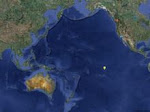We have settled on a three-hour watch schedule during the night. This schedule becomes more flexible during the day, depending on work that needs to be done. On our trip down from Seattle to San Diego, years ago, we did four-hour watches, and found them too long and tiring. Three hours seems to work best for us. But that means that we can never get more than three hours of sleep at a time. This doesn't seem like much sleep, but to put it into perspective, single-handers (those who sail solo) must limit their sleep to 15-minute intervals!
So what do we do on watch? When things are going smoothly, the windvane is steering the boat and the wind is relatively steady, all we have to do is, well, watch. That is, maintain a visual and electronic lookout for other vessels or obstructions. At night we watch for the glow of lights, and periodically look on the chart plotter for AIS targets (this would be other vessels transmitting this data), and occasionally turning on the radar to look for things that don't transmit AIS data, such as a runaway buoy, for example. When something shows up, the watchstander has to monitor it and take evasive action if necessary until it is past.
When things are going less smoothly, the watch person might really have their hands full. Usually this occurs because of shifty winds or really light conditions that the windvane might not be able to cope with. In this case it might call for hand steering. If the winds change enough, they must readjust the windvane or sails to compensate. During some watches, this process is continuous and can get to be pretty tiring. If conditions change significantly enough, the sleeping person might have to be awakened to help change sails. During all this other activity, the person on watch must also continue to watch.
At night, when not on watch, the preferred activity is to sleep - you only get three hours! During the day, it could be relaxing with the guitar, playing games on the iPod, writing blog posts, or doing one of the many tasks that are always required. Depending on how the previous night went, it also might be that you just get some more sleep.



No comments:
Post a Comment